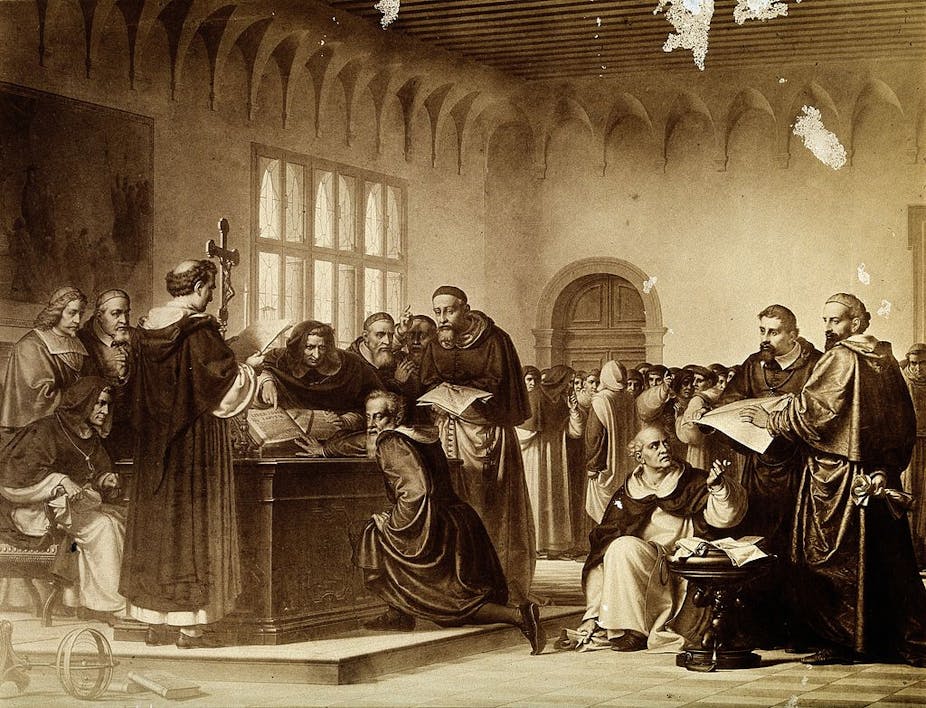It’s 400 years since the Catholic Church censored Galileo and denied him a platform for his arguments for the motion of the Earth – a theory now considered entirely uncontroversial and, indeed, part of our understanding of life, the universe and everything. But in those days, with the Inquisition at the height of its powers, heterodoxy was seen as threatening the very fabric of the Church.
I was reminded of the “Galileo Affair” last year, when controversy erupted over the “No Platform” decision by the executive committee of Manchester University’s Students’ Union to ban the lesbian feminist writer Julie Bindel. She was prevented from speaking at an event on campus called: “From liberation to censorship: does modern feminism have a problem with free speech?”
Bindel’s views on transsexuals – for example in this Guardian column – which included referring to a male-to-female transsexual as a “man in a dress”, led the Manchester students’ union to ban her (along with her fellow invitee, Milo Yiannopoulos) on the grounds that her presence would: “incite hatred towards and exclusion of our trans students”.
As Europe lurched towards the Thirty Years’ War, the Roman Church certainly had a problem with free speech. On February 26, 1616 Galileo was informed by the pope that the Church had decided that his theory of the Earth’s motion “was formally heretical since it explicitly contradicts in many places the sense of Holy Scripture.” He was ordered “to abstain completely from teaching or defending this doctrine and opinion or from discussing it”.
Galileo later complied with a requirement to abjure his opinion. It did not help him much, and he spent the rest of his life under house arrest. Julie Bindel also made a public apology in 2011, for the “tone and content” of her 2004 article in The Guardian in which she wrote that “men disposing of their genitals does not make them women”.
People in all ages have accepted that there are limits to public discourse. There is no unfettered freedom of expression, no right knowingly to utter a false statement, to slander, perjure or shout “fire!” in a crowded theatre. What changes over time and place is what those limits are, who sets them, on what authority and why.
No platform
The No Platform policy of the National Union of Students (NUS) is a recent example that has come in for criticism. It applied traditionally to individuals or organisations which the NUS identified as racist or fascist, such as the English Defence League or Hizb-ut-Tahrir, but the application is spreading. Few would defend platforms in British universities for hate speech, incitement to violence, or holocaust deniers such as David Irving, but now Julie Bindel is banned as transphobic and George Galloway as a rape apologist.
Bindel’s ban was justified by the NUS’s LGBTQ Liberation Campaign. Her invitation was flagged by Manchester’s Student Union executive committee “as potentially in breach of our safe space policy” and refused “based on Bindel’s views and comments towards trans people, which we believe could incite hatred towards and exclusion of our trans students”. Controversy continues as to whether the ban conformed to the union’s policy and Manchester University’s Code of Practice on Freedom of Speech.
Dogma vs debate
In the case of Galileo’s ban, the traditional thesis of conflict between science and religion regards it as a clear example of open-minded scientists suffering at the hands of dogmatic and authoritarian churchmen. More recently, revisionist historians have argued that the Catholic Church had some justification.
Catholicism had to maintain its authority to interpret scripture as many embraced the Protestant “heresy”. The reformist Pope Urban VIII (like Gorbachev in the last years of the USSR) was under pressure from ideological hardliners, and his theologians and inquisitors were empowered to counter deviance.
Moreover, Galileo repeatedly pushed his luck: his Dialogue Concerning the Two Chief World Systems of 1632, which precipitated his trial, signally failed to fulfil his promise to put both sides fairly. Given the sectarian divisions and religiously motivated violence that broke out during the English Civil War, we might conclude that Rome was right. Censorship can close down incitements to violence and hatred.
Beyond freedom and dignity
What are the parallels today? Will students’ understanding of gender be advanced or retarded if radical opinions (abrasively expressed to be sure) are censored? Should sabbatical officers of student unions have the power to decide who speaks? How much authority does the NUS LGBTQ liberation agenda possess? Above all, why is the NUS expanding its restrictions on free speech and what are the dangers that justify it?
Several student unions have rejected “No Platform” – and a transgender student whom I know well would prefer a space to engage with Bindel to a space where they are saved from her by the NUS.
If the Galileo and Bindel affairs are analogous, then history suggests a lesson. I side with historians who conclude that the Catholic Church’s censorship of Copernicanism (and other scientific theories) resulted in northern and Protestant Europe overtaking Italy as the centre of innovation in astronomy and physics.
Of course, a lot is at stake in transgender politics today – but so was there back in 1616 concerning the motion of the Earth.

